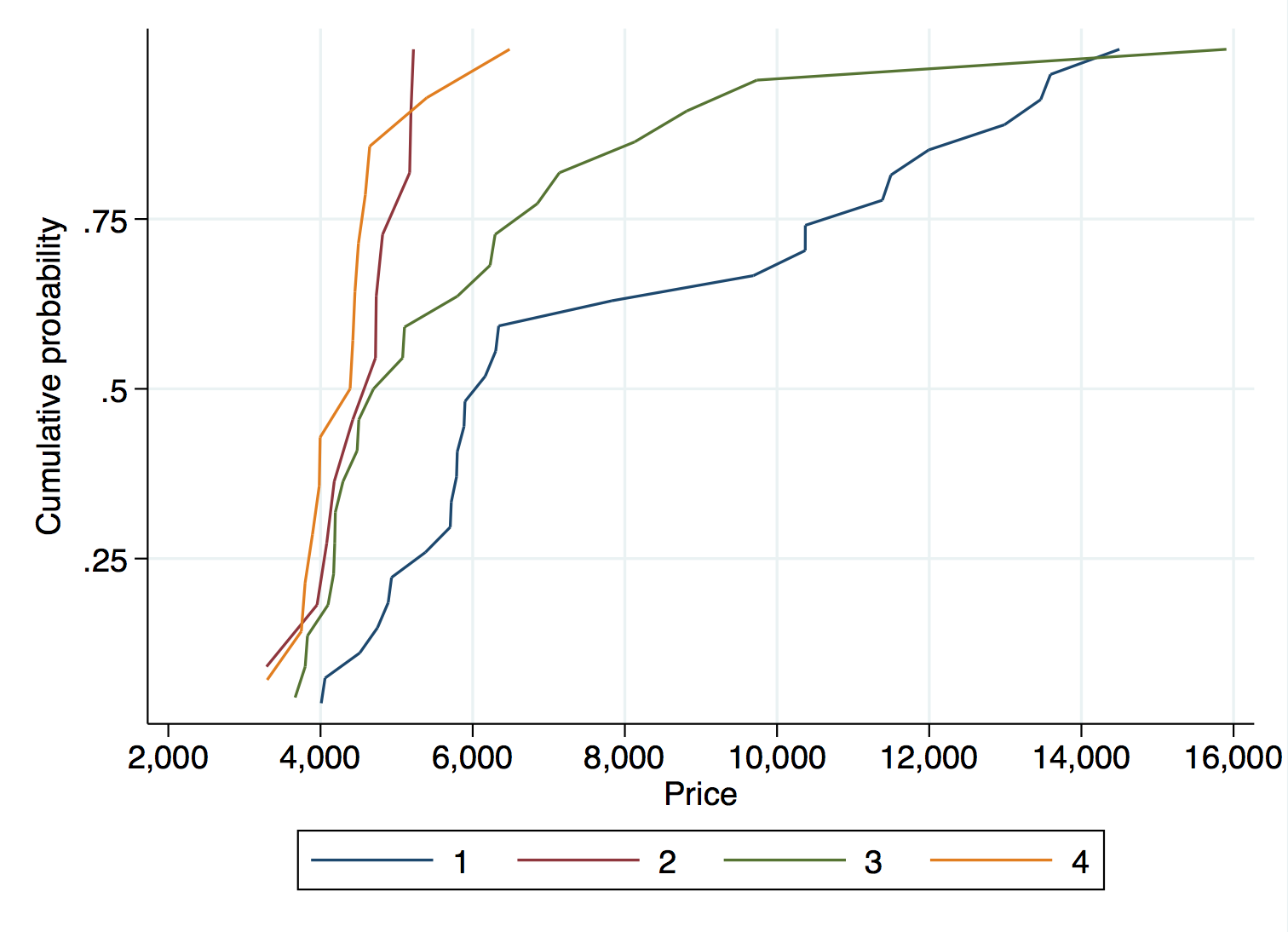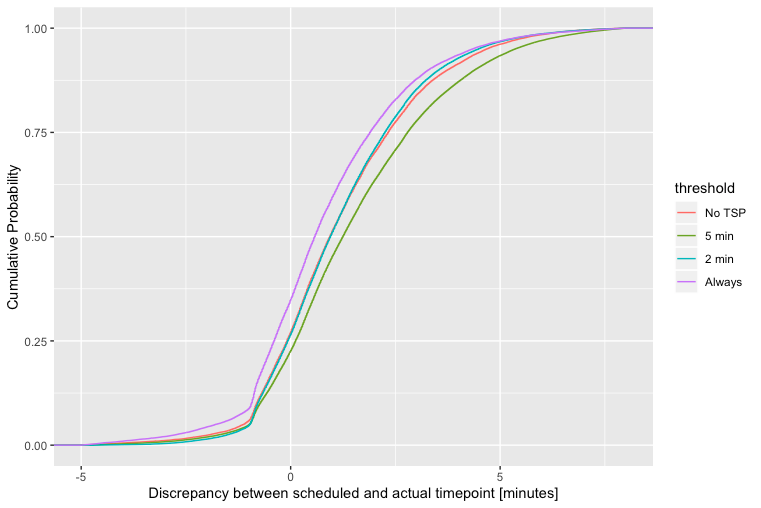You can do something like this with simultaneous-quantile regression with a set dummies corresponding to the 4 groups. This allows you to test and construct confidence intervals comparing coefficients describing different quantiles that you care about.
Here's a toy example where we cannot reject the joint null that the 25th, 50th, and 75th quartile of car prices are all equal in all 4 MPG groups (the p-value is 0.374):
. sysuse auto, clear
(1978 Automobile Data)
. xtile mpg_quartile = mpg, nq(4)
. distplot price, over(mpg_quartile) legend(rows(1)) ylab(.25 .5 .75, angle(0) grid) xlab(#10, grid) ///
> plotregion(fcolor(white) lcolor(white)) graphregion(fcolor(white) lcolor(white))
.
. sqreg price i.mpg_quart, quantile(.25 .5 .75) reps(500)
(fitting base model)
Bootstrap replications (500)
----+--- 1 ---+--- 2 ---+--- 3 ---+--- 4 ---+--- 5
.................................................. 50
.................................................. 100
.................................................. 150
.................................................. 200
.................................................. 250
.................................................. 300
.................................................. 350
.................................................. 400
.................................................. 450
.................................................. 500
Simultaneous quantile regression Number of obs = 74
bootstrap(500) SEs .25 Pseudo R2 = 0.0909
.50 Pseudo R2 = 0.1228
.75 Pseudo R2 = 0.2639
------------------------------------------------------------------------------
| Bootstrap
price | Coef. Std. Err. t P>|t| [95% Conf. Interval]
-------------+----------------------------------------------------------------
q25 |
mpg_quartile |
2 | -1297 528.3106 -2.45 0.017 -2350.682 -243.3178
3 | -1192 447.9346 -2.66 0.010 -2085.377 -298.6225
4 | -1484 458.6527 -3.24 0.002 -2398.754 -569.2459
|
_cons | 5379 414.9198 12.96 0.000 4551.468 6206.532
-------------+----------------------------------------------------------------
q50 |
mpg_quartile |
2 | -1442 1253.755 -1.15 0.254 -3942.535 1058.535
3 | -1086 1414.436 -0.77 0.445 -3907.004 1735.004
4 | -1776 1232.862 -1.44 0.154 -4234.867 682.8667
|
_cons | 6165 1221.461 5.05 0.000 3728.873 8601.127
-------------+----------------------------------------------------------------
q75 |
mpg_quartile |
2 | -6213 1591.987 -3.90 0.000 -9388.118 -3037.882
3 | -4535 1847.591 -2.45 0.017 -8219.904 -850.0963
4 | -6796 1592.095 -4.27 0.000 -9971.334 -3620.666
|
_cons | 11385 1556.486 7.31 0.000 8280.686 14489.31
------------------------------------------------------------------------------
. test ///
> ([q25]2.mpg_quart=[q25]3.mpg_quart=[q25]4.mpg_quart) ///
> ([q50]2.mpg_quart=[q50]3.mpg_quart=[q50]4.mpg_quart) ///
> ([q75]2.mpg_quart=[q75]3.mpg_quart=[q75]4.mpg_quart)
( 1) [q25]2.mpg_quartile - [q25]3.mpg_quartile = 0
( 2) [q25]2.mpg_quartile - [q25]4.mpg_quartile = 0
( 3) [q50]2.mpg_quartile - [q50]3.mpg_quartile = 0
( 4) [q50]2.mpg_quartile - [q50]4.mpg_quartile = 0
( 5) [q75]2.mpg_quartile - [q75]3.mpg_quartile = 0
( 6) [q75]2.mpg_quartile - [q75]4.mpg_quartile = 0
F( 6, 70) = 1.10
Prob > F = 0.3740
The ECDF looks like this:

Though there seem to be large differences between group 1 and groups 2-4 for the 3 quantiles in the graph. However, this is not a lot of data, so the failure to reject with the formal test is perhaps not that surprising because of the "micronumerosity".
Interestingly, the Kruskal-Wallis test of the hypothesis that 4 groups are from the same population rejects:
. kwallis price , by(mpg_quartile)
Kruskal-Wallis equality-of-populations rank test
+---------------------------+
| mpg_qu~e | Obs | Rank Sum |
|----------+-----+----------|
| 1 | 27 | 1397.00 |
| 2 | 11 | 286.00 |
| 3 | 22 | 798.00 |
| 4 | 14 | 294.00 |
+---------------------------+
chi-squared = 23.297 with 3 d.f.
probability = 0.0001
chi-squared with ties = 23.297 with 3 d.f.
probability = 0.0001


